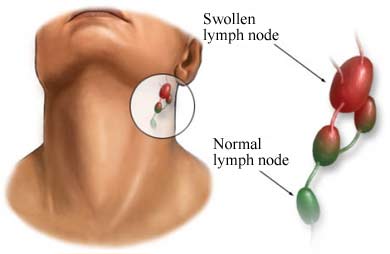Allergies have different forms, from mild to even life-threatening ones. They can make your life very miserable. The symptoms of an allergy become noticeable when the immune system overreacts to an allergen. Common known allergens include pollen, molds, dust mites, insects, strings, food, etc. Hives, skin redness and skin itchiness are common, accompanied by a stuffy and watery nose, eye redness, eye itchiness, etc. But, do allergies cause swollen glands as well?

Can Allergies Cause Swollen Glands?
The answer depends on the type of allergies.
Seasonal Allergies
Seasonal allergies occur only during certain times of the year. Pollen and molds are the common allergens. In general, seasonal allergies don’t directly cause swollen glands and lymph nodes. However, these allergies can lead to ear infections or sinus infections, which can eventually result in swollen glands on the neck or the ear.
Treatment
When this occurs, antibiotics or antiviral medications are recommended to treat the infection. The swollen glands will gradually return to their normal size as the infection improves.
However, you should seek immediate medical help if:
- You notice that your swollen lymph glands last longer than 2 weeks.
- The glands are getting bigger in size and become larger than the size of a kidney bean.
- The glands are hard to touch and painful.
- You have swollen lymph nodes in other body parts like in the groin or armpit area, besides your neck.
Food Allergies
Can allergies cause swollen glands? Yes, food allergies are accompanied with swollen lymph glands. Swelling of the lymph nodes occurs due to the release of histamine, a chemical found in high levels during a food allergy. Higher levels of histamine are released from white blood cells and mast cells, eventually getting deposited into the soft tissue. This will gradually lead to a swelling of the lymph nodes.
The signs and symptoms of a food allergy will be visible in the entire body. Common symptoms include skin rash, hives, skin redness, skin inflammation, nausea and vomiting, diarrhea, stomach pain, swelling of the lips, tongue and throat, facial swelling, nasal congestion, dizziness, difficulties breathing, whizzing, coughing, etc. Food allergies can be life-threatening, leading to anaphylaxis.
Treatment
Can allergies cause swollen glands? Yes if it’s food allergy. So what can you do to relieve it?
- In cases of a minor reaction to a food allergy, over-the-counter antihistamines will solve the problem.
- Anytime you notice a severe allergic reaction accompanied by swelling of the lymph nodes and swelling of the lips, tongue and throat, seek immediate medical help. In these cases, an injection of epinephrine is necessary. In general, people who do have severe allergic reactions to certain types of food carry an epinephrine auto-injector which tends to save their lives until the emergency unit arrives.
Here are some tips which can help you minimize adverse reactions to common foods:
- Avoid certain types of food like milk, eggs, nuts, peanuts, fish, wheat, soy, etc. If you do know that you are allergic to a type of food or if you have had an allergic reaction, especially a severe one, don’t eat that type of food ever again. Make sure to ask your friends, family or waiters in restaurants the food ingredients before eating or ordering food. Read food labels when in grocery stores as well.
- Consume foods rich in vitamin C. You can even take it as a daily supplement. It is well known that vitamin C strengthens the cell membranes, including those of mast cells. So less histamine will be released, and you will not have swollen glands.
- Essential fatty acids can help decrease the response of the immune system and the inflammatory reactions, as well as maintain a normal function of the T-cells. One tablespoon of fish oil, evening primrose oil or vegetable oil is recommended daily for this purpose.
Other Causes and Treatments of Swollen Glands
Can allergies cause swollen glands? Sometimes. Other causes of swollen glands include:
|
Common Infections |
Uncommon Infections |
Immune System Disorders |
Cancers |
|
|
|
|
The treatment of swollen glands will depend on the underlying cause.
- Swollen lymph nodes due to a viral infection tend to resolve on their own after the viral infection resolves. However, antiviral medications may be recommended.
- Swollen lymph nodes due to a bacterial infection require antibiotic treatment.
- Swollen lymph nodes due to HIV/AIDS infection require specific treatment for this medical condition.
- Swollen lymph nodes due to immune disorders such as rheumatoid arthritis or lupus require treatment directed on the underlying cause.
- Swollen lymph nodes due to cancers require specific treatment depending on the type of cancer. In general, treatments include surgery, radiation therapy or chemotherapy.
Seek immediate medical help in cases when swollen lymph glands are accompanied with:
- High fever
- Difficulties breathing
- Difficulties swallowing
- Redness of the skin over the swollen lymph nodes
- Night sweats
- Weight loss, etc.
